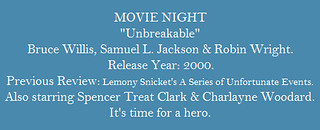
Review #1183: Unbreakable.
Cast:
Bruce Willis (David Dunn), Samuel L. Jackson (Elijah Price/Mr. Glass), Robin Wright (Audrey Dunn), Spencer Treat Clark (Joseph Dunn), Charlayne Woodard (Mrs. Price), Eamonn Walker (Dr. Mathison), Leslie Stefanson (Kelly), Michaelia Carroll (Babysitter), Whitney Sugarman (Physical Therapist), Bostin Christopher (Comic Book Clerk), Elizabeth Lawrence (School Nurse), and Chance Kelly (Orange Suit Man) Directed by M. Night Shyamalan (#039 - The Sixth Sense and #902 - Split)
Review:
What would the world be like if a super human suddenly existed? Unbreakable (the fourth film directed and written by Shyamalan) puts forth the possibilities of what could happen through its own take on the superhero origin story that has stood out in the years following its release. When it was released in November of 2000, films involving superheroes (with their respective origins) were not as vast as they are today, particularly one like this that takes itself seriously as a mystery thriller and make it work for the most part while having its parallels to the three-part structure of a comic book story.
Undeniably, it is the performances from Willis and Jackson that really dominate the film, whether when by themselves or when they act against each other. Willis delivers a subtle performance, being easy to follow along with his pursuit of meaning without needing to make a quip or feeling bland. On the other side of the coin, Jackson does well with his performance with a good degree of subdued nature that is interesting to watch. One particular favorite scene of mine involves him arguing with a customer wanting to buy a comic book drawing for his 4-year old son, as one can see his point (in some way) about being insulted at the idea that his collection is like a toy store in his delivery of said lines. Clark is certainly one to take time to get used to, but he does a fine job with acting opposite Willis as an on-screen son that drives the points for the film home handily. This can be applied to Wright as well, who shows off a human element for her parts on screen.
The movie doesn't rely on action to drive its point home, relying on music from James Newton Howard and cinematography by Eduardo Serra to carry a mood of suspense, with only one fight sequence occurring near the end, which is quiet but effective in its own way. Admittedly, the part that doesn't stand quite well as the other aspects of the film is the nature of the ending. I find that the twist is fairly clever and that it likely works just as well upon a re-watch, but it is the sudden nature of the ending (complete with a title card) that makes the execution feel a bit abrupt. The best thing that can be said is that at least the problem isn't that there needed to be a big grand climax to make this tale more interesting, since the movie works just fine without needing too many effects. With the entertainment that the film delivers, it is no wonder that the film eventually received a follow-up, although not certainly in the way one expected. Although the film was a moderate success that made back three times its $75 million budget, no direct sequels followed for over a decade. Sixteen years later, Split snuck into theaters as a psychological horror thriller through the eyes of a super-villain (who had a presence in early drafts for this film before being dropped) with a subtle connection to this film that eventually resulted in a sequel (and the third part of what is considered a trilogy) named Glass (2019). In any case, this is a rewarding movie with an interesting story and characters that is light on spectacle but filled with perspective on the human element for a superhero tale.
Next Review: Glass (2019).
Overall, I give it 8 out of 10 stars.

No comments:
Post a Comment